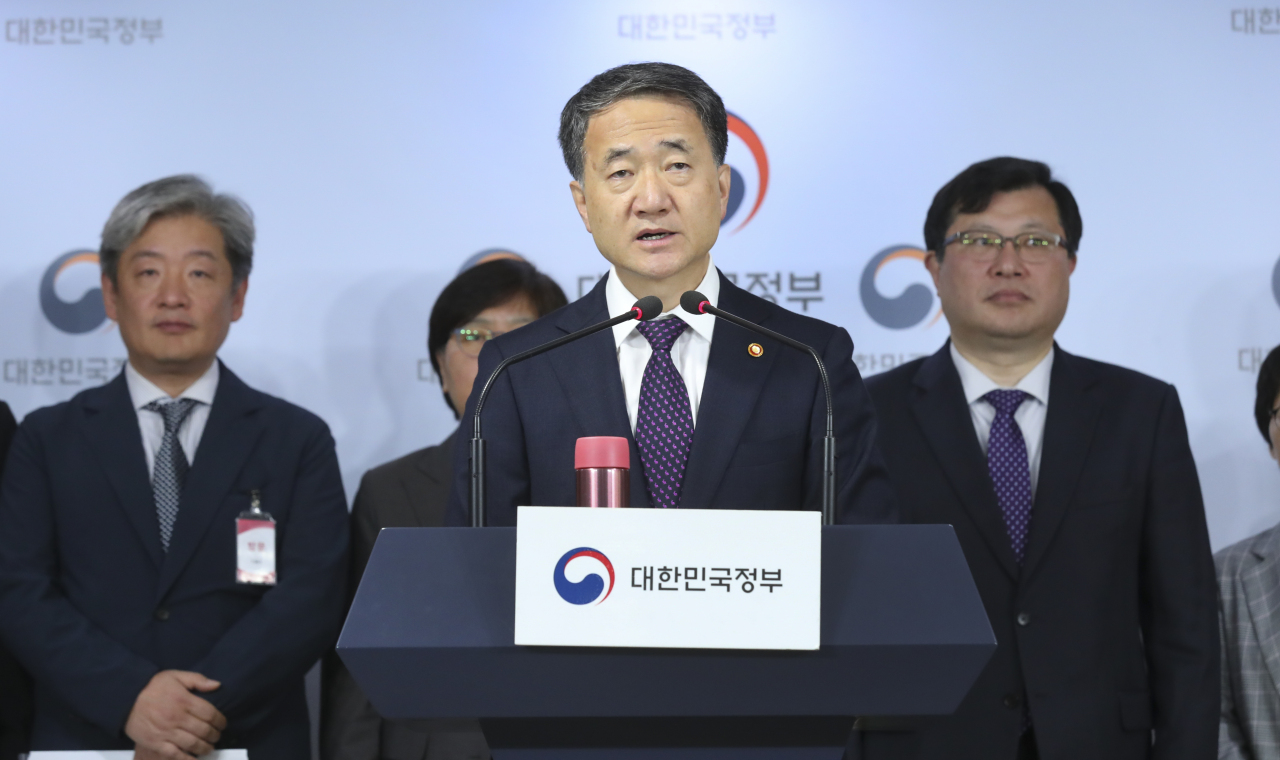[Newsmaker] Government issues ‘grave warning’ against liquid e-cigarettes
By Kim ArinPublished : Oct. 23, 2019 - 15:24
The government on Wednesday warned against using liquid e-cigarettes, or e-liquids, until health perils associated with them are better understood.
“The Health and Welfare Ministry strongly recommends discontinuing the use of liquid e-cigarettes until the link between lung injuries and liquid e-cigarettes is clearly identified,” said Health Minister Park Neung-hoo in a press briefing Wednesday morning.
“Teenagers and those with respiratory diseases, in particular, should stop using (e-liquids) immediately,” the minister said.
Park said the Health Ministry would “take every possible measure” to discourage vaping until its “health consequences are thoroughly understood.”

On Oct. 8, the first suspected instance of an e-liquid-related illness was reported in South Korea. The patient was admitted to a hospital for acute respiratory symptoms after six months of vaping, and medical staff reported the case to Korea’s Centers for Disease Control and Prevention.
According to the health and drug safety ministries, 1,479 cases of severe lung injury and 33 deaths possibly linked with e-liquid use had been reported in the United States as of Oct. 15.
In the US, about 79 percent of e-liquid users who experienced lung injury were younger than 35, the ministry said, noting the increase in vaping among younger demographics in Korea as well. Some 78 percent of patients with lung injuries used products containing THC, the psychoactive component of cannabis, and 10 percent used only nicotine.
Korea’s CDC said it was working closely with its US counterpart to devise follow-up measures to address what is increasingly emerging as a health emergency globally.
The Health Ministry said it would push for new laws on smoking safety, which it hopes will be passed in the parliament by year-end.
If passed, the laws would extend the legal definition of cigarettes to include e-liquids containing nicotine extracts from tobacco stems and roots. Tobacco product manufacturers and importers would be required to submit detailed information on ingredients and additives. Adding flavors to cigarettes would be banned and authorities would be allowed to recall or prohibit the sale of tobacco products that are deemed to have an adverse impact on public health.
Pulmonologist Chun Eun-mi at Ewha Womans University Medical Center said one of the biggest risks of vaping comes from lack of research.
“There is no research studying long-term effects of vaping because of its short history,” she said. “We don’t know what kind of impact vaping will have on health in 20 years, or even 10 years.”
Chun said the ingredients that go into the “vape juice” are not analyzed yet, either.
“There was recent finding the e-cigarette liquids contained heavy metals such as nickel and cadmium, but we don’t know if that came from the vaping cartridges or the juice.”
The Food and Drug Safety Ministry is leading research into potential harmful components in e-liquids, to be completed by next month.
A joint research team comprising experts from the public and private sectors, organized by Korea’s CDC and the Korea Academy of Tuberculosis and Respiratory Diseases, will look into suspected cases of vaping-related lung diseases.
The Korea Customs Service’s customs clearance policy division chief, Lee Jong-wook, said until a new law can be enacted the most effective strategy to contain the vaping epidemic is to prevent the products from circulating.
“The customs service will beef up regulations on purchasing e-liquid products from overseas,” Lee said.
The Ministry of Economy and Finance’s public enterprise management director Cho Hyun-jin said the ministry, together with the Health Ministry, was in the process of determining tax rates on e-liquids and how differently they should be taxed from existing cigarette products.
By Kim Arin (arin@heraldcorp.com)

















![[KH Explains] Hyundai's full hybrid edge to pay off amid slow transition to pure EVs](http://res.heraldm.com/phpwas/restmb_idxmake.php?idx=652&simg=/content/image/2024/04/18/20240418050645_0.jpg&u=20240419100350)

